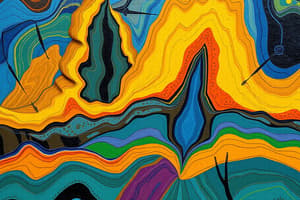Podcast
Questions and Answers
What is Earth science also known as?
What is Earth science also known as?
Geoscience
Name one of the topics that Earth science questions might address in a typical science exam.
Name one of the topics that Earth science questions might address in a typical science exam.
Geology
What is the study of atmospheric processes, such as weather patterns and climate change, known as?
What is the study of atmospheric processes, such as weather patterns and climate change, known as?
Meteorology
What does oceanography study?
What does oceanography study?
What is the study of celestial bodies, including stars, planets, and galaxies, called?
What is the study of celestial bodies, including stars, planets, and galaxies, called?
What is the main concept behind plate tectonics theory?
What is the main concept behind plate tectonics theory?
Describe the processes involved in the rock cycle.
Describe the processes involved in the rock cycle.
What defines weather patterns?
What defines weather patterns?
Explain the difference between weather and climate.
Explain the difference between weather and climate.
How can visual aids such as graphs, maps, and diagrams be helpful in Earth science exams?
How can visual aids such as graphs, maps, and diagrams be helpful in Earth science exams?
Study Notes
Science Exams: Exploring Earth Science
Science exams, particularly those focusing on Earth science, provide an opportunity to delve into the mysteries and processes that shape our planet. In this article, we'll explore the key concepts, common themes, and assessment strategies in Earth science exams.
Earth Science Overview
Earth science, also known as geoscience, is the multidisciplinary field that studies the Earth's physical, chemical, and biological systems. This includes geology, meteorology, oceanography, astronomy, and environmental science. In a typical science exam, Earth science questions might address topics such as:
- Geology: The study of the Earth's structure, composition, and processes, including plate tectonics, volcanology, and mineralogy.
- Meteorology: The study of atmospheric processes, such as weather patterns, atmospheric circulation, and climate change.
- Oceanography: The study of the Earth's oceans, including their physical, chemical, and biological properties, as well as their interactions with the atmosphere and land.
- Astronomy: The study of celestial bodies, including stars, planets, and galaxies, and their interactions with the Earth and other astronomical objects.
Key Concepts
To prepare for an Earth science exam, it's essential to understand a handful of fundamental concepts. Here are some key ideas to master:
- The Water Cycle: The continuous movement of water from the Earth's surface through the atmosphere, land, and back to the surface.
- Plate Tectonics: The theory that the Earth's lithosphere is divided into large, moving plates that interact to create mountains, volcanoes, and earthquakes.
- Rock Cycle: The processes by which rocks are formed, transformed, and destroyed, including metamorphism, weathering, and erosion.
- Weather Patterns: The temporary atmospheric conditions characterized by weather phenomena such as rain, snow, wind, and temperature.
- Climate: The long-term weather patterns of a region, influenced by factors such as ocean currents, mountain ranges, and human activity.
Assessment Strategies
Earth science exams are typically designed to evaluate students' understanding of the fundamental concepts, problem-solving abilities, and critical thinking skills. Some common assessment strategies include:
- Multiple-choice questions: These questions present students with a statement or scenario and offer four or more possible answers. They can be used to assess basic knowledge and understanding of concepts.
- Short-answer questions: These questions require students to provide brief responses, often in the form of single sentences or short phrases. They can be used to assess comprehension and recall of basic facts and concepts.
- Essay questions: These questions require students to provide extended written responses, often in the form of paragraphs or several sentences. They can be used to assess students' critical thinking and problem-solving abilities, as well as their understanding of more complex concepts and theories.
- Graphs, maps, and diagrams: These visual aids can be used to present data or illustrate concepts, and students may be required to interpret them and answer related questions.
- Laboratory activities: These hands-on activities can be used to assess students' understanding of scientific concepts and processes through practical applications.
Preparation Tips
To prepare for a science exam focusing on Earth science, follow these tips:
- Master the key concepts: Make sure you have a solid understanding of the fundamental ideas and processes involved in Earth science.
- Practice problem-solving: Work through practice problems and exercises to improve your critical thinking and problem-solving skills.
- Make connections: Look for relationships between different Earth science topics and concepts. Understanding these connections can help you better understand the material and may be useful in answering exam questions.
- Use visual aids: Utilize diagrams, graphs, and maps to help you visualize Earth science concepts and processes.
- Review past exams: Analyze past exams to identify common question types and topics. This can help you better understand the format and content of the exam and develop appropriate study strategies.
- Seek help when needed: If you're struggling with a particular concept or topic, don't hesitate to seek help from your teacher, classmates, or tutor.
By following these tips and understanding the fundamental concepts and assessment strategies of Earth science exams, you'll be well-prepared to tackle any test that comes your way. Good luck!
Studying That Suits You
Use AI to generate personalized quizzes and flashcards to suit your learning preferences.
Description
Explore the key concepts and assessment strategies commonly found in Earth science exams. Learn about fundamental topics like the water cycle, plate tectonics, and climate, as well as assessment methods such as multiple-choice questions, short-answer questions, and essay questions.




